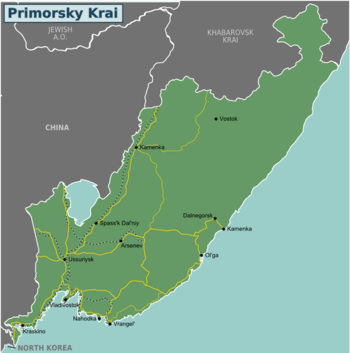Primorsky Krai
Primorsky Krai (Russian: Примо́рский край, pree-MOHR-skee krigh) is a region in the Russian Far East, which borders China to the west, Khabarovsk Krai to the north, and North Korea to the extreme southwest.
Cities

- 🌍 Vladivostok — the regional capital, largest city, the terminus for the Trans-Siberian Railway, and a major Russian naval port
- 🌍 Artyom — a city where the airport serves all civil flights
- 🌍 Khasan — some sort of a curiosity for the buffs of geopolitics, this village was the site of a Russo-Japanese battle, and hosts the last station before the border on the rail link to North Korea
- 🌍 Nakhodka — a major port and proposed "free economic area"
- 🌍 Terney — Nowadays the village Terney is considered to be among the most beautiful in the Primorski Region.
- 🌍 Ussuriysk — the second to last city on the Trans-Siberian Railway
Other destinations
- The 🌍 Sikhote-Alin mountain range — a Unesco World Heritage site of a mixed ecosystem combining features of taiga and the subtropics, home to the endangered Amur Tiger; also the site of the enormous Sikhote-Alin meteorite crash
- 🌍 Bolshoi Kamen — a town in the south of Primorsky Krai. It was closed due to its naval base and the Zvezda shipyard, but this status was revoked in 2015.
- 🌍 Dalnegorsk
- 🌍 Fokino — a closed town due to the Russian Pacific Fleet is based there; foreigners must have a special permit to visit the town. However, the closeby islands of Putyatin and Askold are open for visits by tourists, which are attracted by the unique flora and fauna in the waters surrounding the islands and its underwater landscape.
- 🌍 Lesozavodsk
Understand
History
Primorsky Krai was ruled by the Jurchen people until the 14th century when their kingdom "Bohai" was destroyed by Mongol invasion. There were several Chinese and Korean villages and hunters' "fanza"s when Russians explorers and Cossacks established their posts. Primorsky Krai (a.k.a. Primorye) is Russia's main outlet to the Pacific Ocean. 95 settlements were founded by the Russians in the latter half of the 19th century. During the February Revolution the Krai became a part of Far-Eastern Republic. The Civil War brought American, Japanese, and Czechoslovak intervention and caused emigration to China and other countries. It was the landing site of the USS Hornet in 1942 before it raided on Japan. Josef Stalin deported 174,000 Koreans from the border areas across the Far East to Uzbekistan and Kazakhstan between 1937 and 1939. Today, Vladivostok is newly open to foreigners and is the principal attraction and destination in the region.
Climate
Primorsky Krai is influenced by cold, dry continental air in the winter. Temperatures at this time of year are well below freezing even on the coast. Summers are mild and wet, with warm monsoon rains frequently arriving from the south. August is the warmest month.
The mixing of arctic and subtropical influences is made evident in the great diversity of the region's flora and fauna, including the rare Amur Tiger and Amur Leopard.
Talk
Expect to hear Russian and not much else except in hotels catering to foreigners. A lot of students learn English so finding somebody to give you directions is not a huge problem.
Get in
International flights arrive at Vladivostok (VVO IATA) from Tokyo, Beijing, Seoul, Busan, Bangkok, Hanoi, Harbin, and Pyongyang. Domestic flights are available to Vladivostok as well from major Russian airports across the country.
The most popular way of arriving to Primorye, however, is via the Trans-Siberian Railway, which travels through Ussuriysk and terminates at Vladivostok.
From China by bus via Pogranichyy-Suifenhe crossing point. The buses shuttle every day.
Get around
See
Do
- Explore the natural karst caves in the south near Ussuriysk
Eat
- Fish!
Drink
All major sorts of local beer are produced by OOO "SUBMiller RUS" and include: Рыцарь Приморья, Студеное, Владпиво, Жигулевское,Velkopopovicky Kozel in dark and lager modifications.
Coca-Cola is unusually fresh here, because of the factory's proximity.
Stay safe
Cope
Ecotourism clubs
- Ecotourism club 'Sikhote-Aline' (Клуб экологического туризма 'Сихотэ-Алинь'), 46, Chapaevskaya St, ☎ +7 42374 31-000, e-mail: wx2@ya.ru adm@terney.info, wx2@ya.ru. 10AM-9PM. Excursions around Terney, Primorski krai and Sikhote-Alin in English, Spanish and Franch languages.